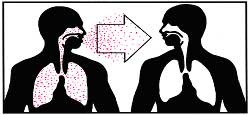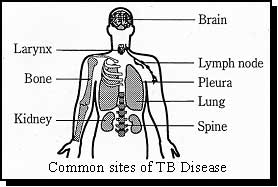Contact Info
Active TB Disease
This fact sheet gives general information about active TB disease including symptoms, complications, tests, and treatment.
On this page:
Facts about active TB
How did I get TB?
How does TB disease affect my body?
How do doctors test for TB?
How can I get better?
What happens if I don't take the medicine?
Can I spread TB to other people?
What else should I know about TB?
What should I know about TB medicine?
- Download PDF version formatted for print:
Active TB Disease (PDF)
Facts about active TB
If your tests show that you have active tuberculosis, or "TB" disease, here are some facts you should know:
- TB is a serious disease that can be cured with the right treatment and medicine.
- Some people with TB disease can spread the disease to other people.
How did I get TB?
Anyone can get TB. When someone with TB in their lungs coughs, sneezes, or talks, TB germs can be sprayed into the air. Anyone close by can breathe the germs into their lungs. You cannot get TB from shaking hands or from food, dishes, linens or other objects.

When the TB germs got into your body, they went "to sleep." "Sleeping" TB germs do not hurt your body or make you sick. This is called "latent TB infection" or "LTBI." LTBI can last for a short time or many years. You got sick from TB when the germs "woke up" and started to grow and hurt your body. This is called "active TB disease."
How does TB disease affect my body?
TB disease usually affects your lungs (pulmonary TB). TB can hurt other parts of your body too.

People with TB disease may have 1 or more of these symptoms:
- Coughing for 3 weeks or longer
- Losing weight
- Poor appetite
- Sweating at night
- Fever
- Chills
- Feeling tired or weak
- Pain in the chest
- Coughing up blood or brown-colored material from your lungs
How do doctors test for TB?
You may need more than 1 test for TB disease:
- A Mantoux skin test can tell whether you have TB germs in your body, even if they are "asleep."
- A chest x-ray can tell whether the germs have hurt your lungs.
- Sputum culture tests can tell whether TB germs are growing in your lungs.
How can I get better?
- You need to see a doctor and take special TB medicines to kill the TB germs.
- TB germs are strong and live a long time. You will feel better a few weeks after you start to take the TB medicines. To be sure that all of the TB germs are killed, you must keep taking TB medicines for at least 6-9 months.
- It is important to see your doctor every month until your TB treatment is finished. The doctor will do tests to be sure you are getting better, ask if you have any problems with the medicines, and answer your questions.
What happens if I don't take the medicine?
TB germs are very strong. If you don't take all of your medicine correctly, you could become sick again and spread TB to other people.
You must take all of your medicines exactly as your doctor tells you to in order to be cured. If you do not take your medicine correctly, your TB could become even stronger. You would have to take stronger medicines for a longer time.
What is DOT?
"DOT" means Directly Observed Therapy. DOT makes it easy to take your pills. DOT is when a nurse or health care worker sees you every day to give you TB medicine. This is the best way to make sure you get all the medicine you need and your treatment is working. If there is a problem with your medication it can be fixed right away.
DOT cures TB!
Can I spread TB to other people?
If TB is in your lungs, you must be careful to protect other people from your TB germs. If TB is in other parts of your body, the TB germs usually cannot spread to other people.
Ask your doctor or nurse whether your TB can spread to others (is contagious). They will tell you what to do to protect people close to you.
After you have been taking medicine for a few weeks and you are feeling better, you can no longer spread TB germs. Your doctor will tell you when you can return to work, school, or other activities.
What else should I know about TB?
- Ask your doctor or nurse about getting TB medicine from the Minnesota Department of Health.
- Tell your doctor or nurse if you plan to move to another city or state. They can help make sure you get TB medicine after you move.
- If you have TB, ask your doctor for an HIV test. People with HIV can get very sick from TB. You may need different TB medicines if you have HIV.
What should I know about TB medicine?
- The medicines for TB are usually safe, but some people have side effects. If you have any of these symptoms, call or see your doctor immediately:
- Vomiting, pain in stomach
- Poor appetite
- Nausea
- Yellow eyes or skin
- Tingling fingers or toes
- Tingling or numb mouth
- Blurred vision or change in your vision
- Ringing in your ears
- Trouble hearing
- Dizziness
- Aching joints
- Fever for more than 3 days
- Skin rash
- Bleeding or bruising easily
- Take all of your TB medicine at the same time every day.
- Keep taking your TB medicines until you doctor tells you to stop.
- Don't drink beer, wine or liquor while taking TB medicines.
| Your clinic/doctor/nurse: | |
| Phone #: (_____) | |
| Your TB pills are: | |
| ______ | Isoniazid ("INH") |
| ______ | Rifampin |
| ______ | Pyrazinamide ("PZA") |
| ______ | Ethambutol |
| ______ | Vitamin B6 |
| ______ | ____________________________________________________ |
| ______ | ____________________________________________________ |
